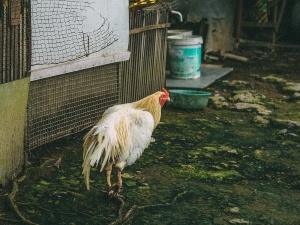
Raising chickens involves keeping an eye on your birds to make sure that they are always in good health. If your chicken’s poop starts to look different, you’d be right to be worried. This article looks into why this happens.
Table of Contents
Black tar chicken poop:
Chickens, and other animals, cannot talk to us humans and tell us that something is wrong with them, but a change in a chicken’s behavior, appearance, or poop can signal a change in your bird. Your bird may have black, tar-like poop because:
Diet:
Your chicken’s diet will affect how the bird’s poop comes out. A number of foods can cause your bird to poop a black, tar-like poop
Foods that cause your bird to produce this type of poop include black or purple treats like blueberries, raisins, blackberries, wood ash, or charcoal. Barley can make your birds poop sticky.
What to do:
If your bird is eating too many dark, blue, or purple-colored foods, then you’d need to reduce how much of these treats you’re feeding your bird.
Treats should only make up 10 percent of a chicken’s diet. If you’re feeding your bird more treats than this, then consider cutting back. Your bird’s poop should go back to normal after this.
Also, consider feeding your bird different treats; a variety of foods will maintain the normal brown color of your bird’s poop. Feed your chicken less barley to prevent the bird’s poop from being sticky.
Wood ash and charcoal are not harmful to chickens, but you may want to remove these from your bird’s diet if you want to keep your bird’s poop brown and not black.
Cecal poop:
Chickens usually produce brown clumpy poop, but chickens also produce black-colored poop. This poop is sticky, ploppy, tarry, and very smelly. This poop is produced every 8-10 poops and is called cecal poop.
Chickens have two pouches at the end of the small intestine, and before the beginning of the large intestine, these pouches are called cecal pouches.
Cecal pouches collect fibrous material from the small intestines, reabsorb water from the material, and then ferment and break down the material.
Tough and fibrous materials need to be digested separately in these pouches because they cannot be digested normally.
After digestion, fermentation, and water absorption, the bird will expel this leftover material as cecal poop. This poop is only made up of the contents of these pouches.
Urates (the white material that is usually expelled with normal chicken poop) are not released with caecal poop.
What to do:
Cecal poop is normal; chickens should be producing this poop on a regular basis. There is nothing that you need to do if your bird is producing caecal poop.
In fact, regular cecal poop production means that the bird’s body is working normally.
As long as the bird is foraging normally and is acting normally, then there isn’t anything that needs to be done.
Internal bleeding:
If the above two reasons aren’t the reason behind your bird’s black and sticky poop, then the reason may be internal bleeding
If your chicken has recently suffered an internal injury then the bird may be bleeding internally. This blood will be digested as though it is food and your bird’s poop will come out black.
What to do:
The best thing you can do for a bird that is suffering from internal bleeding would be to take it to the vet. The vet will examine the bird, give you a diagnosis, and treat the bird.
FAQ:
What does coccidiosis poop look like in chickens?
The poop of a chicken with coccidiosis is usually runny and loose, and the droppings have blood or mucus in them.
That being said, just because the poop is reddish does not mean that your bird has this condition. An abnormal shedding of Cecal cells can also cause red poop in chickens.
So, the only way to truly know if your bird has this condition is to take the animal to the vet and have its droppings tested.
What are the end-of-life signs of chickens?
Signs that your chicken is nearing the end of its life include increased lethargy. This is the main sign: the bird will seek a cozy place to rest for most of the day.
Other signs include pale skin, cold feet, stiffness, difficulty jumping up or down, and a lack of appetite
If you enjoyed this article then you may also be interested in other chicken related articles. Here are some articles that you may be interested in: Baby Chick Making Green Poop, Chicken Puffed Up Tail Down, Chicken Has A Floppy Comb + Is Lethargic, Baby Chick Suddenly Can’t Walk, What Does Black Chicken Poop Mean?

